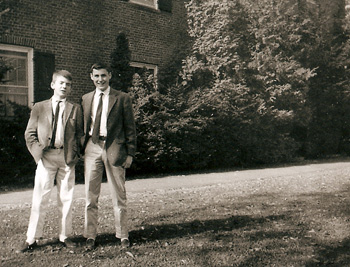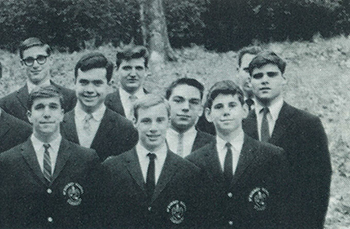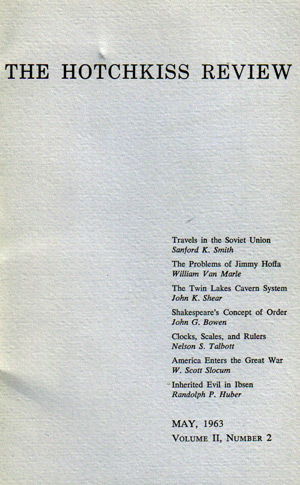|
 |
...... |
This is a New York story about a
bunch of New York kids who hung around together in the early sixties--except
that it wasn't yet the sixties of the Beatles, marijuana, the Stones. It was
1962, or so, and kids wore neat striped ties, weejuns, and Brooks Brothers
sweaters. They slow danced to "Where or When," the Dion and the Bellmonts
version of the old Rodgers and Hart tune, with girls from Hunter--the smart
girls public school--or stylish girls from Brearley who lived on Park Avenue.
The guys had names--or nicknames--like Rock and Minnie
whose real name was Jerry. He liked to be called Minnie after the Jackie Gleason
character--Minnesota Fats--in The Hustler. In high school, Rock, whose real name
was Ronald, wrote his first (unpublished) novel. There was a character named
Tubs, who was modeled after Jerry. Minnie was dynamic: he always looked like he
was about to burst out of his blue blazer. At one point, barely out of his
teens, he was romancing both his girlfriend and her attractive mother.
They had another friend named Henry who always had some
tangled problem with girls. Henry wanted to be an actor. His hardworking
German-Jewish immigrant father wanted him to get better grades (and forget
acting). In the school cafeteria, Henry would imitate James Dean--the famous
planetarium scene at the end of Rebel Without a Cause where Jimmy runs toward
the cops screaming: "I've got the bullets."
Once, walking in Central Park with Minnie, Henry
interrupted Bobby Morse, the Broadway actor, who was playing a softball game
with the cast of How to Succeed in Business Without Really Trying. Henry told
Morse he wanted to be an actor. Morse said frankly it was a tough life and that
Henry should do himself a favor and forget it.
Junior year Henry and Minnie were in a school play that
was more or less improvised by Minnie. He played a cowboy and walked around
stage in a huge hat. Minnie brought down the house with every move, without
really trying. No one took much notice of Henry. Off-stage they used to call him
"The Village Idiot." Who could predict in a few years that he would be a famous
TV actor--and that no one would remember Bobby Morse? Another
time, Henry and Rock met actor George Maharis
whose TV show, Route 66, had just been canceled. The show was a take-off (some
would say rip-off) of Jack Kerouac's novel, On the Road. Maharis was a Kerouac
look-alike, a good looking Greek kid from Queens. Henry asked the actor what had
gone wrong with the show. Maharis answered: "They don't screw around with George
Maharis." Henry loved the tough guy act. For days after, he went around telling
everyone: "They don't screw around with George Maharis." Later, it became: "They
don't screw around with Arthur Fonzarelli." |
|
In that pre-drug, apolitical era it was girls, girls,
girls. There was Betsy, a sophisticated doctor's daughter, whom Henry introduced
Rock to and Lorrie from Long Island who didn't have a brain in her head and who
was crazy about Minnie. Minnie later told writer Suzanne Munshower of trysts in
their families' apartments--but no one can recall any girl whom Henry was
attached to for long.
One time Minnie was trapped in an elevator trying to
referee a terrific quarrel between Henry and his girl of the moment. Finally,
Minnie stepped back and said: "I feel like U Thant..." referring to the Burmese
head of the United Nations. Henry stopped, looked at Minnie, and asked: "What's
U Thant?"
At 17 Rock was wild. A friend who went to Deerfield described him as a "preppy James Dean" with a little Italian thrown in. He crashed a driver's ed car
racing across the 59th Street Bridge; the instructor expelled him from the class.
Henry loved to tell that story. Rock read Thomas Wolfe and Raymond Radiguet, the French novelist
who died at 20, and wanted to be a writer. When he was eleven years old, Rock would wander to the New York Public Library
on Saturday afternoons to read about the Loeb-Leopold case. Later, in Hollywood, Henry told
director Marty Pitts of Rock: "That guy was crazy."
Rock
had been tossed from Hotchkiss--a
Connecticut boarding school. Founded in 1891, the school stressed firm Protestant values of strong character and self-discipline, wrapped in a 19th century classical education. Among its illustrious alumni were Brit Hadden and Henry Luce, co-founders of Time magazine, and poet Archibald MacLeish, the former Librarian of Congress. Rock had met Henry there a few summers before when
Henry was making up lost credits. Rock had failed Latin, the first of two times. The school told him that he had "a negative attitude," and claimed that
he was "tolerated rather than well-liked by his classmates" (most of whom
Rock had no use for).
|
|

Shear (on the right) at the Kiss |
|

Rones, Henry, Rock upper left to upper right |
|
Later, Rock would hang around with Henry and Minnie.
Sometimes a Hotchkiss friend of Rock's named Shear would tag along. Shear was
the son of a Princeton professor; for some reason, he liked to be called Scuzz.
His specialty was forging notes so his friends could cut classes. He loved Hank
Williams and the Blue Sky Boys. At the Kiss he won an award for an essay on
Ambrose Bierce, the ascerbic writer who was supposedly killed by Pancho Villa.
Rock and Shear drank a lot and told people they were cousins. Senior year at
Hotchkiss, Shear explored a local limestone cave and published a scholarly paper
on his findings. He named an alcove, "Rock's Lost Passage." Once, he and another
student named Tom had blown up the school radio station in a prank that went
awry. The incident was written about in a story in Esquire, a few years after
Tom entered the federal reformatory at Petersburg. |
|
|
|
|
|
|

The Hotchkiss connection |
|
Most weekends there was a party or dance at Temple Rodef Shalom on the West Side. Once a month or so a kid named Rones threw a party that everyone would
crash. Rones always had girls around him. He liked it when they told him that he
looked like Paul Newman. "Rones doesn't give a damn," a brilliant kid named Ross liked to say.
Rones's parties were great. Everyone would dance and
sing along to Del Shannon's "Runaway," including Rones's father who played the
guitar. Henry spent most of his time fighting with whoever was his Hunter High
School girlfriend. Later, Rones became a prominent New York City judge.
Rock and Minnie also knew a middle age Jewish divorcee
who enjoyed the company of young gentlemen. One night Rock and Minnie took Henry up to
meet her. Shear joined in the evening's merriment.
Somewhere along the way, they got the idea that they
would all attend college together and keep the party going. They looked at Brown
and Tulane which then both had programs that encouraged chronic underachievers
to apply. The applicants were called, "thinkers, not doers." But when the time
came, only Rock and Rones went off to college together.
The last time Minnie, Rock, and Henry got together,
Henry was making a living doing TV commercials. He had just finished a movie
with another unknown named Stallone. Henry said that when he saw the rough cut,
all he noticed was his nose walking around on screen. He was hoping to get a TV
show, maybe a series.
Shear did a tour of duty on an aircraft carrier,
off Vietnam, then became a wealthy Boston investment banker. He died young, in the
eighties, of a stomach ailment.
Rock wrote a few paperback books, then studied
constitutional law at Chicago, and settled down to the quiet life of a small
town lawyer.
Minnie became a successful businessman--in sales, of
course. |
|
|
|
Once, on a trip West, after Henry had become the Fonz,
Minnie called to say hello, but the actor did not return the call. When Minnie
told Rock about it, they just laughed. Their old friend, Henry, they told each
other, was where he belonged: in Hollywood, and maybe he had the last laugh,
too. |
|
|
|
|

